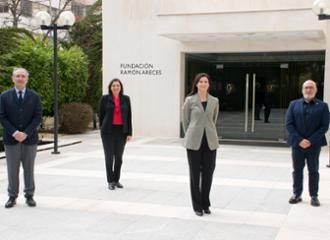Research projects
Start of main content
Cellular therapy for West's syndrome
16th national competition for scientific and technical research
Gene and regenerative therapy
Senior Researcher : Manuel Álvarez Dolado
Research Centre or Institution : CABIMER. CSIC
Abstract
West's syndrome (WS) is the most common infantile epileptic encephalopathy, although its frequency leads to its being included among the rare diseases (1:5,000). It is characterised by recurring crises called spasms, progressive psychomotor retardation and a typical EEG denominated hypsarrhythmia. It is due to mutations in the ARX gene, which codes for a homeobox transcription factor that is fundamental for the generation, migration and development of the GABAergic interneurons of the striated body, cerebral cortex and hippocampus. Animals which are mutant for ARX present a reduction in the number of interneurons in the said areas.
The majority of children with WS are refractory to pharmaceutical treatment, so they need a therapeutic alternative. This may be in the form of cell therapy, as the neurons that have disappeared can be replaced. Previous results of this group show that fetal neural progenitors derived from the middle ganglion eminence (MGE) differentiate into GABAergic interneurons after being implanted into the neonatal and adult brain. These progenitors are able to integrate fully within existing circuits, modulating inhibitory activity within the regions they are implanted in. This makes it possible to reduce hyperactivity levels, and they also have an anticonvulsive effect.
At the present time, a series of transplants has commenced with these neuronal precursors in an animal model which is a transporter of the (GCG)10+7 mutation, the most frequent among WS patients. This model has studied the distribution, survival, differentiation and functionality of the cells deriving from transplant, as well as effects on the symptoms characterising this syndrome. It will also evaluate the potential and clinical interest of this type of cell therapy.
-
 Activities related
Activities related
-
 Projects related
Projects related
-
 News related
News related
-
 Publications related
Publications related
 Activities related
Activities related
-
27
Nov
2019
International Symposium Undiagnosed and rare diseases in children and adolescents: Translation to clinic and society Barcelona, Wednesday and Thursday, November 27 and 28, 2019 9:30 hours
-
26
Sep
2022
Conference Terapia génica y celular avanzada… Más allá de la última frontera Madrid, Monday, 26 September 2022, 19:00 hours
-
9
May
2024
Conference Genes de mosca y genes humanos: una comparación Madrid, Jueves 09 de mayo de 2024, 19:00 horas
 Projects related
Projects related
- Synthetic nanoparticles as an innovative treatment for sepsis (SPRINT-4-SEPSIS) 2018 Senior Researcher : Antonio Artigas Raventós Research Centre or Institution : Instituto de Investigación e Innovación Parc Taulí (I3PT), Corporación Sanitaria i Universitaria Parc Taulí
- Risk Assesment of Bacterial Sepsis using multiomic and bioinformatics tools: an approach towards the Precision Medicine in Infectious Diseases 2018 Senior Researcher : María Teresa Coque González
- Extracellular vesicles biomarkers for the diagnosis and prognosis of post-surgical septic shock 2018 Senior Researcher : Eduardo Tamayo Gómez Research Centre or Institution : Hospital Clínico Universitario de Valladolid
 News related
News related
-

Eric D. Green: “La genómica debe integrarse en la medicina convencional”
Published on 03/12/2021
 Publications related
Publications related
End of main content




